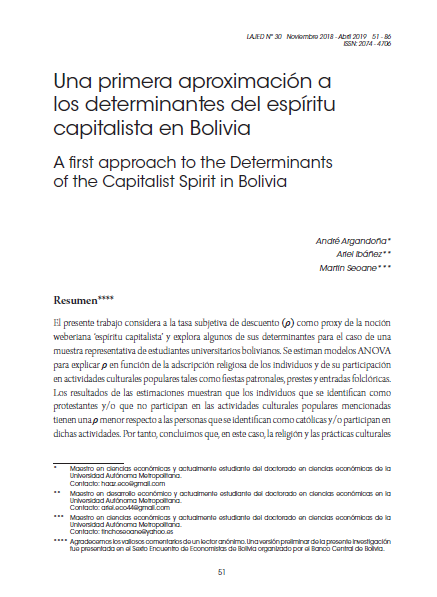A first approach to the Determinants of the Capitalist Spirit in Bolivia
DOI:
https://doi.org/10.35319/lajed.20183014Keywords:
Subjective discount rate, capitalist spirit, economic growthAbstract
The present paper considers the subjective discount rate (ρ) as proxy of the Weberian notion ‘capitalist spirit’ and explores some of its determinants in the case of a representative sample of Bolivian university students. ANOVA models are estimated to explain ρ in terms of the religious affiliation of individuals and their participation in popular cultural activities such as patron saint festivals, prestes and folk festivals. The results of the estimates show that individuals who identify themselves as Protestants and/or who do not participate in those popular cultural activities have a lower ρ respect to people who identify themselves as Catholic and/or participate in the cultural activities described. Therefore, we conclude that, in this case, religion and cultural practices have an important role in the formation of the ‘capitalist spirit’ and we emphasize the importance of ρ to incorporate subjective factors in growth models.
Downloads
References
Acemoglu, D. 2008. “Growth and Institutions”. En: Steven Durlauf y Lawrence Blume: The New Palgrave Dictionary of Economics. Second Edition. Palgrave Macmillan.
Argandoña, A. y M. Seoane. 2012. “Tasa subjetiva de descuento y tipos de racionalidad: Una aproximación empírica a los factores subjetivos del crecimiento”. Bolivia: ARU [inédito].
Bataille, G. 2007[1976]. La parte maldita. Argentina: Las cuarenta.
Bohm-Bawerk, E. 1986[1889]. Capital e interés. México: FCE.
Cordova, J. 1992. Protestantismo rural y modernización: modernización marginal y protesta religiosa en Cullacachi. La Paz: (s/e) CEB.
Echeverría, B. 2011. Antología. Bolivia: Vicepresidencia del Estado Plurinacional de Bolivia.
Estermann, J. 2009. Filosofía andina: sabiduría indígena para un mundo nuevo. La Paz: ISEAT.
Fisher, I. 1930. The Theory of Interest. NY: McMillan.
Frederick, S., G. Loewenstein y T. O’Donoghue. 2002. “Time Discounting and Time Preference: A critical Review”. Journal of Economic Literature, 40 (2), 351-401.
Frías, V. 2002. Mistis y mocochinches. Mercado, evangelicos y política local en Calcha. La Paz: Mama Huaco.
Greif, A. y Guido Tabellini. 2017. “The clan and the corporation: Sustaining cooperation in Chine and Europe”. Journal of Comparative Economics, 45, 1-35.
Gujarati, D. 2004. Econometría. México: McGraw-Hill.
Hardisty, D., K. Thompson, D. Krantz y E. Weber. 2013. How to mesure discount rates? An experimental comparison of three methods. SSRN Working Paper Series.
Polanyi, K. 1994 [1947]. “Nuestra obsoleta mentalidad de mercado”. Cuadernos de Economía, 14(20), 249-266.
Rae, J. 1834. The sociological theory of Capital. London: McMillan.
Raffo, L., y B. Zuluaga. 2008. “Optimización dinámica y modelos de crecimiento con consumo óptimo: Ramsey, Cass-Koopmans”. Apuntes de economía, 11, 2-25.
Samuelson, P. 1937. “A Note on Measurement of Utility”. Review of Economic Studies, 4(2),155-161.
Schumpeter, J. 2006[1954]. History of Economic Analysis. Cambridge: Taylor & Francis.
Solow, R. 1957. “Technical change and the aggregate production function”. The Review of Economics and Statistics, 39(3), 312-320.
Tassi, N., C. Medeiros, A. Rodriguez-Carmina y G. Ferrufino. 2013. “Hacer plata sin plata”: el desborde de los comerciantes populares en Bolivia. La Paz: PIEB.
Weber, M. 2007 [1905]. La ética protestante y el espíritu del capitalismo. Argentina: Gradifco.
Zavaleta, R. 1986. Lo nacional-popular en Bolivia. México: Siglo XXI.






